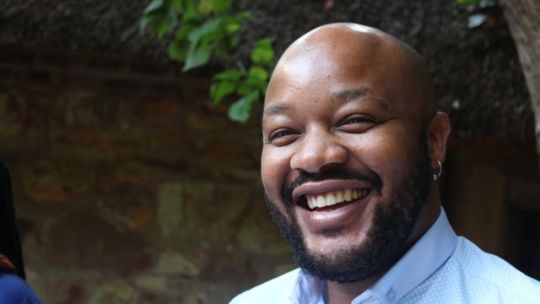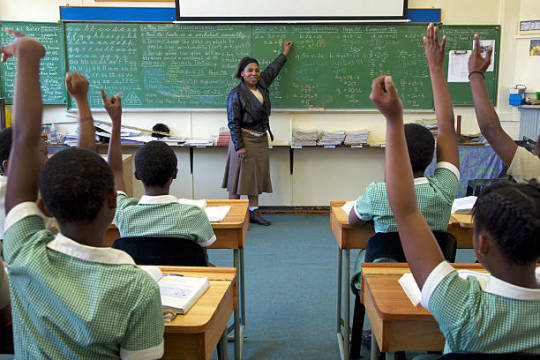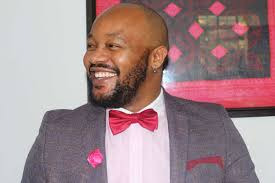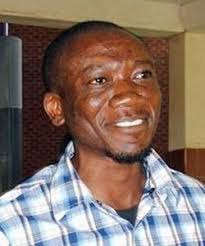#Denis Nzioka
Photo

Denis Nzioka
Gender: Male
Sexuality: Gay
DOB: 6 August 1985
Ethnicity: Kenyan
Occupation: Activist, writer, journalist
Note 1: Been instrumental in the formation of several organisations focused on queer and sex worker's rights while supporting regional organising around sexual diversity, bodily autonomy and choice-expression
Note 2: First Kenyan to publicly come out on national TV. Started the first - and only - LGBTI magazine in Kenya, Identity Kenya, as well as was the first in the continent and globally in 2014, to unveil an LGBTIQ news App on Google Stores.
#Denis Nzioka#lgbt rights#black excellence#lgbt#mlm#male#gay#1985#black#kenyan#african#poc#activist#writer#journalist#first
85 notes
·
View notes
Text
Private to Public School Student Transfers on the Rise as Parents Face Economic Uncertainties

Private to Public School Student Transfers on the Rise as Parents Face Economic Uncertainties
In recent months, a significant number of parents have opted to transfer their children from private schools to public institutions in response to challenging economic circumstances, according to investigations by The Nation.
Despite facing issues such as poor infrastructure and understaffing, public schools have observed an unusually high influx of students who made the switch in January.
ALSO READ: School Transfer Process and Instructions in Kenya
Managers of private schools acknowledged to The Nation that they are grappling with substantial amounts owed by parents, with many of them on payment plans. While denying a mass exodus from their schools, data from public schools paints a different picture.
Bungoma DEB Primary School, for example, has witnessed a surge of over 300 new students transferring from various schools in just two months, with approximately 200 of them originating from private academies. The sudden influx has strained the school's infrastructure, leading to overcrowded classrooms and stretched resources.
Mr. Tobias Khisa, the headteacher of Bungoma DEB Primary School, highlighted the challenges, stating that the current student-to-teacher ratios exceed recommended limits, causing significant strain on the educational environment. He revealed ratios of 1:63 in primary classes and 1:70 in junior classes, exacerbated by the recent influx from private schools.
The chair of the Kenya Private Schools Association, Mr. Charles Ochome, acknowledged the economic challenges faced by parents but emphasized that schools handle payment issues differently based on their relationships with parents.
ALSO READ: The Role and Process of Obtaining an Area Chief's Letter for School Transfers
As families reassess their financial priorities, the cost of education has emerged as a major concern. Job uncertainties, salary cuts, rising inflation, and other financial pressures have led many parents, once comfortable affording private school tuition, to struggle financially.
The transition from private to public schools has its challenges for students, as noted by Mr. Khisa, who mentioned potential culture shock due to differences in classrooms, infrastructure, and homework.
Education Cabinet Secretary Ezekiel Machogu acknowledged the ministry's awareness of the transfers and their impact on public school infrastructure and learning quality. He explained that the government has allocated Sh1 billion for school infrastructure, addressing the need for increased capacity in public schools, especially in urban areas.
Mr. Johnson Nzioka, the national chair of the Kenya Primary Schools Heads Association, highlighted the growing trend of students transferring from private to public schools, particularly in urban centers, with a notable impact on Grade 6 admissions. The shift is influenced by economic considerations, with some smaller private schools lacking the capacity for junior secondary sections.
ALSO READ: Principals Wants Grade Nine Transfer to Secondary Schools
Mr. Nzioka emphasized the strain on public school infrastructure, with efforts made to balance the admission process and address challenges arising from the transition.
In Nairobi, a school reported a five percent increase in students shifting from private to public institutions, attributing the trend to challenging economic conditions and shifts in parents' daily lives. The headteacher noted the significant figure, considering existing limitations in resources and infrastructure.
Private to Public School Student Transfers on the Rise as Parents Face Economic Uncertainties
Read the full article
0 notes
Text
Online archive focuses on LGBT Kenyans from 1800s on
Activist and author Denis Nzioka has launched KumbuKumbu, a new free resource that collects and preserves records documenting Kenya’s sexual and gender diverse cultures from the 1800s to today.
(more…)
View On WordPress
0 notes
Text
Queer African Spotlight: Activists and Rafiki (2018)
In my last post, I talked about how visibility and representation has the power to combat the sentiments of governments and other powerful institutions that queerness is inherently “un-African”. The concept that a group of people cannot identify a certain way because of their racial, ethnic, or religious identity is a flawed one that has managed to erase people for quite a while now. But just as it is important for queer Africans to resist these ideas, it is also important to recognize and uplift queer African figures who are fighting these stigmas put forth by institutions in their societies. I believe this is important because LGBTQIA+ activism often solely focuses on people in the West rather than individuals from more Eastern nations. In this post, I want to simply highlight queer activists who are fighting the archetypical idea of what it means to be “African”. Here are just a few queer African advocates I admire.
African LGBTQ+ Advocates
I mentioned in my post titled “Queer History in Uganda” the Ugandan activist named Pepe Julian Onziema. Onziema is a human rights defender who identifies as a trans-man. He is the program director of Sexual Minorities Uganda (SMUG) and has had an illustrious career fighting for the rights of queer individuals in Uganda and the rest of the continent. Onziema has worked on the African Commission on Human and People’s Rights and the United Nations Human Rights Council. Moreover, he was awarded the Clinton Global Citizen Award for Leadership in Civil Society in 2012 for his efforts in advocating LGBTQ+ welfare as well as Stonewall’s “Hero of the Year” award in 2014.

Pepe Julian Onziema
Denis Nzioka is a Kenyan queer activist and writer who has worked for various groups such as the Gay and Lesbian Coalition of Kenya (GALCK), Gay Activist Alliance Africa-Kenya, and G-Kenya Trust. He has a prolific career in writing and his works on gay culture and politics can be found in a number of publications, such as Kenya lmagine and GayKenya.

Denis Nzioka
Paul Kasonkomona is a Zambian activist who focuses mainly on HIV/AIDS. He was arrested in 2013 after speaking openly about the Zambian government’s violation of the rights of queer-identified people. Following his release, he has continued to fight for LGBTQ+ rights.

Paul Kasonkomona
-
I believe that Professor William J. Spurlin explained a very poignant view of how queer individuals globally can begin to understand the nuance in their respective experiences in the book Gendering Border Studies. The realities of queer life in the United States are vastly different than those of queer life in these countries in Africa, which are often erased or seen as being only quashed by government and religious figures. But the efforts being made by these people are just as valid and real as those of White and Western figures, who have long been the exclusive faces of queer liberation. He states “...queer activism/studies in the West, must include the circulation of sexuality transnationally…which can further unsettle reductive readings of homosexuality as alien to particular nations and to particular racial, ethnic, or national identities, and as having...privileged status in the West”.
Representation in activism makes a massive difference in how movements for queer liberation are actualized on a global scale. Although these aforementioned advocates have been in hostile environments where their identities are policed, their fights are valid and necessary, and they also deserve to be uplifted for their work much like activists in the West. Further, the challenge of changing what it means to be “African” is something that needs to be undertaken within the continent and outside of it, as many people often do not associate queer identity with Sub-Saharan countries. In my opinion, a large part of the effort needed to challenge the effects of European colonialism is to change the narrative of the African identity that has long been controlled by people in power who have excluded the potential intersections that queerness creates.
0 notes
Link
The regional governor in charge of Tanzania’s most populous city is ramping up an anti-gay crackdown.
Governor Paul Makonda said last week that he’s forming a task force to identify, track down, and arrest gay people in Dar es Salaam — a region in the East African country of Tanzania with a major city by the same name that’s home to about 4 million people. Makonda has encouraged citizens to report on those they believe to be gay, and said officials had received more than 5,000 calls or messages so far, naming about 100 individuals.
“I have received reports that there are so many homosexuals in our city, and these homosexuals are advertising and selling their services on the internet,” Makonda said in a video last week, according to CNN. “Therefore, I am announcing this to every citizen of Dar es Salaam. If you know any gays … report them to me.”
Video of Paul Makonda, the regional commissioner for Dar es Salaam, Tanzania, asking Tanzanians to report to him about alleged gays within three days. Says he has received reports of gays using social media to ‘advertise’ themselves. pic.twitter.com/dqH7NRNtSN
— DENIS NZIOKA (@DenisNzioka) October 29, 2018
Fear is the prevailing mood in Dar es Salaam right now, James Wandera, the founder of LGBT Voice Tanzania, told me. He said many people have gone into hiding to avoid arrest, with some relocating to different areas to protect themselves.
“We try to find safe places until things cool down,” Wandera said of his organization, which was founded in 2009. The group has also staffed lawyers to defend those who may be arrested.
The Tanzanian government has distanced itself from Makonda’s harsh policy in the wake of international pushback. Officials have said the crackdown is not official government policy and just Makonda’s opinion — although activists point out that Makonda was appointed by the Tanzanian president and is seen as a close ally of the current leader, John Magufuli. Arrests of suspected gay men have also reportedly happened outside his jurisdiction.
The European Union recalled its ambassador from Tanzania on Monday because of the “deterioration” of human rights and rule of law in the country.
The United States condemned the “deteriorating human rights situation” in Tanzania on Friday. “We are troubled by the continued arrests and harassment of marginalized persons, including lesbian, gay, bisexual and transgender people, and others who seek to exercise their rights to freedom of speech, association and assembly,” State Department spokesperson Heather Nauert said in a statement. “Legislation is being used to restrict civil liberties for all.”
The US State Department had previously issued a warning to US citizens traveling or living in the country and urged them to “remove or protect” social media images that “may run afoul of Tanzanian laws regarding homosexual practices and explicit sexual activity.”
Human rights groups have condemned the repressive policies in Dar es Salaam. “This could turn into a witch-hunt and could be interpreted as a license to carry out violence, intimidation, bullying, harassment and discrimination against those perceived to be LGBT,” United Nations High Commissioner for Human Rights Michelle Bachelet said in a statement last Friday.
Tanzania has witnessed an increasingly aggressive targeting of gay people in the country in recent years under President John Magufuli, who was elected in 2015, activists told RTE, an Irish outlet.
In 2016, the government banned lubricant, claiming it encouraged homosexuality and that banning it would help stop the spread of HIV. It also suspended US-funded HIV/AIDS programs that provided outreach and health care to gay men.
President Magufuli said last year that “even cows” should condemn homosexuality and threatened to deport or arrest gay rights activists in the country.
Makonda — the regional governor who’s leading the current crackdown in Dar es Salaam — has been among the most vocal anti-LGBT leaders in the country. He’s used harsh anti-LGBT rhetoric in the past and promised clampdowns against the gay community, including, in 2016, threatening to arrest people who were connected to gay men through social networks.
Tanzania still has anti-sodomy laws on the books, a vestige of British colonialism, though homosexuality itself is not criminalized. And Tanzania’s policies weren’t as repressive as those in other countries in the region, such as Uganda, which sought to pass a strict anti-gay law in 2014. But Tanzania has, in recent years, trended toward more persecution of gay communities, not less.
This latest crackdown in Dar es Salaam, then, is part of an increasingly hostile climate for gay people in Tanzania.
Hundreds of Tanzanian LGBT activists have now gone into hiding. People are trying to avoid arrest, Wandera told me, where they’re often subject to humiliating physical examinations.
The police chief of the south region of Zanzibar, an island off Tanzania, told the Associated Press that authorities had arrested 10 men suspected of participating in a gay marriage ceremony at a hotel. Suleiman Hassan, the police official, said those men will undergo a physical to attempt to determine if they’ve had same-sex relations.
Wandera’s all-volunteer organization is now trying to help protect those who might be targeted and to connect those who’ve gone underground or relocated with emergency resources
Wandera said his group will continue to operate. He won’t go into hiding, and he isn’t afraid of getting arrested. “You go to the front line, you die or come back. Risking means doing the work, because you can’t do it unless you risk.”
Original Source -> Tanzania’s anti-gay crackdown is sending people into hiding
via The Conservative Brief
0 notes
Text
Ghana's Speaker of Parliament says Ghana will not consider changing laws that makes homosexuality illegal https://t.co/fal5YRzzLN
— DENIS NZIOKA (@DenisNzioka) July 12, 2017
via @Dloz_Lami
July 12, 2017 at 10:35AM
0 notes
Text
Now more than ever: We need LGBTQI allies to ‘come out’
Now more than ever: We need LGBTQI allies to ‘come out’
Kenyan activist Denis Nzioka celebrates the courage of LGBTQI allies in the struggle for LGBTQI rights — and asks that their voices be more widely heard in conversations about sexuality and human rights for all.
(more…)
View On WordPress
#Alliances for Solidarity#Allies#Denis Nzioka#IDAHOT#International Day Against Homophobia and Transphobia
0 notes
Text
Zimbabwe progress toward LGBT role in HIV fight
Zimbabwe progress toward LGBT role in HIV fight
Zimbabwe’s location in southern Africa
Activists see Zimbabwe’s new Public Health Bill as progressive, though not fully, for its inclusion of key populations — direct citations, and referencing LGBT persons, and importance of confidentiality from health providers. http://ow.ly/UwDB30iWiB3
Much of the information in this item is courtesy of Kenyan activist Denis Nzioka.
View On WordPress
0 notes
Text
KENYA: Decriminalise sex work, activists urge
KENYA: Decriminalise sex work, activists urge
Kenya: Commercial sex workers in Busia County on Saturday marked International Sex Worker Rights Day with an appeal to the national government to legalize their occupation. http://ow.ly/8UCy30iMWpo
Link and text courtesy of Denis Nzioka
View On WordPress
0 notes
Text
Kenya court heads toward ruling on anti-gay laws
Kenya court heads toward ruling on anti-gay laws
As a Kenyan high court heads toward a decision on whether to overturn the country’s two anti-LGBT laws, homophobic Kenyans are worried.
(more…)
View On WordPress
#Abu Ayman Abusufian#CitizenGo Africa#Denis Nzioka#Eric Gitari#Kenya#National Gay and Lesbian Human Rights Commission#NGLHRC
0 notes
Text
All mouth, no muscle -- anti-gay party in Kenya
All mouth, no muscle — anti-gay party in Kenya
Logo of Kenya’s tiny Republican Liberty Party.
For a political party so weak that it has no members in parliament, Kenya’s Republican Liberty Party has an amazing knack for grabbing the attention of the media.
The most recent example: The supposed plans for a 5,000-person nude protest if President Obama spoke about LGBTI rights during his recent trip to Kenya.
Obama did exactly that, but…
View On WordPress
0 notes
Text
Tabloid joins politician, bishops in targeting LGBTI Kenyans
Tabloid joins politician, bishops in targeting LGBTI Kenyans
Front page of the Weekly Citizen. (Photo courtesy of Ambrozio Barigye Wazabanga via Facebook)
In the wake of last month’s High Court decision in favor of a Kenyan organization seeking human rights for LGBTI people, some anti-gay Kenyans have opened the door to even more intense persecution of LGBTI Kenyans.
The latest step in that direction was today’s publication by Kenya’s tabloid Weekly Citizen
View On WordPress
#Binyavanga Wainana#Denis Nzioka#Eric Gitari#Kenya#National Gay and Lesbian Human Rights Commission#NGLHRC#Pope Francis#Red Pepper#Rolling Stone#Uganda#Weekly Citizen#William Ruto
2 notes
·
View notes
Text
youtube
Watch the American Climate Leadership Awards 2024 now: https://youtu.be/bWiW4Rp8vF0?feature=shared
The American Climate Leadership Awards 2024 broadcast recording is now available on ecoAmerica's YouTube channel for viewers to be inspired by active climate leaders. Watch to find out which finalist received the $50,000 grand prize! Hosted by Vanessa Hauc and featuring Bill McKibben and Katharine Hayhoe!
#ACLA24#ACLA24Leaders#youtube#youtube video#climate leaders#climate solutions#climate action#climate and environment#climate#climate change#climate and health#climate blog#climate justice#climate news#weather and climate#environmental news#environment#environmental awareness#environment and health#environmental#environmental issues#environmental justice#environment protection#environmental health#Youtube
5K notes
·
View notes
Text
60 to 90 arrested in raid on gay bar in Nairobi
60 to 90 arrested in raid on gay bar in Nairobi
Club Envy in Nairobi
Kenyan police arrested 60 to 90 people, including dozens of alleged LGBT people, in a raid on a gay bar in Nairobi early on Sunday, July 6.
Their alleged crime? “Getting caught at a gay bar,” the tabloid-style Kenyan website Ghafa reported.
That account differs from what Kenyan journalist/activist Denis Nzioka reported on Facebook — that the arrests at Club Envy apparently…
View On WordPress
0 notes
Text
Anti-gay Kenyans seek crackdown, new laws
Anti-gay Kenyans seek crackdown, new laws
Member of parliament Irungu Kang’ata (Photo by Samuel Kariuki courtesy of Denis Nzioka)
Members of parliament in Kenya are making plans to seek tougher anti-gay laws. At the same time, they are calling for stricter enforcement of the country’s existing laws against homosexual activity, Kenyan journalist Denis Nzioka reports.
Citing “reliable sources,” Nzioka reported that “a draft bill…
View On WordPress
0 notes
Text
Prediction: Kenya too will enact anti-gay laws
Prediction: Kenya too will enact anti-gay laws
Denis Nzioka
Kenya will join Uganda and Nigeria in enacting tougher laws against sexual minorities, Kenyan LGBT rights activist and journalist Denis Nzioka predicts.
“It might be sooner than you expect,” he says. Nzioka noted:
There will be a demonstration against homosexuality organised by the lobby group, Maendeleo ya Wanaume (MYW).
Dubbed “Not in Africa” the demo been planned for February 24,…
View On WordPress
0 notes